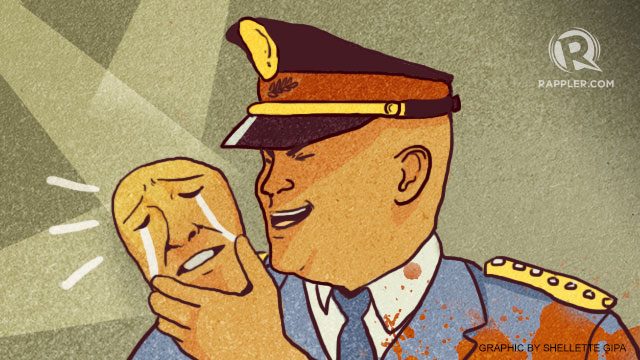SUMMARY
This is AI generated summarization, which may have errors. For context, always refer to the full article.
![[Newspoint] The general lets a round tear fall](https://www.rappler.com/tachyon/r3-assets/612F469A6EA84F6BAE882D2B94A4B421/img/D50E797189D44466921883A2E35102A0/vergel-santos-headshot-150px.jpg)
It’s hard for Ronald dela Rosa to attract sympathy – not even after shedding copious tears at a Senate hearing last week.
That is not only because he is the chief of police; or because, bald and built solid, he doesn’t look at all like any sympathetic figure; or because his name has the sort of ring that inspires thoughts of theatrics; or because tear-shedding seems to have become a proficient habit with him – it recalls for me the parody by the British humorist Richard Armour of a Shakespearean line: “[With remarkable control of the tear ducts] she lets a round tear fall.”
Rather, it’s because he simply doesn’t get it.
Dela Rosa – and also the public attorney, Persida Acosta, who shared his sentiments with similar moistness – may have been genuinely, deeply hurt, but their reaction seems to me just too self-centered, too insensitive, too disproportionate for tears.
The hearing was instanced by the apparent mistaken summary execution of a boy of 17, Kian Loyd delos Santos. If indeed a mistake, it was a horribly spectacular one. Barangay and social welfare agency records show nothing that might raise suspicions of Kian being into anything bad, let alone drugs, the reason for his misfortune. Acosta herself has affirmed that; in fact, it’s her office that is prosecuting the accused policemen.
But she joined Dela Rosa in his tearful protest against suspicions, raised by Senator Risa Hontiveros, of a “policy” that tends to minimize and cover up mistaken or collateral killings in the war on drugs and also of a “pattern” to all the killings. How dare anyone question the motives of the people who put their lives on the line every day to make the streets safe for every citizen, Dela Rosa protested in defense of his men. For their part, the other police officials at the hearing, again joined by Acosta, intoned a supporting refrain: the death of one Kian does not a policy or a pattern make.

In a way they’re right: Kian’s case is an exception, but only in that it escaped into the light, was caught on closed-circuit television, not to mention witnessed by a crowd of neighbors, and, thus flagrantly revealed, could not be ignored even by a Senate normally apologetic for Duterte.
But with policy and intent plain enough in Duterte’s own words – “death” for anyone who’s into drugs, and presidential “protection” and “pardon” for the police pursuing his war – how can Dela Rosa’s protestations of death-defying public service be credible at all? Pattern is spelled out in one common word – nanlaban (fought back) – in the narrative for the more than 2,000 kills to which the police have owned: beside each body lay a gun and somewhere close by, some packets of drugs.
Several thousand more kills are blamed on “vigilantes,” as if these summary executioners drew inspiration from anyone other than Duterte. In fact, some of them have been themselves found to be policemen operating in a pattern of their own: assassins setting out in pairs, riding motorcycles in tandem.
By the time President Duterte himself decided to weigh in, the body of 19-year-old Carl Angelo Arnaiz had turned up; he had suffered the same misfortune as Kian – police had put 5 slugs into him. Still, like Kian, Carl was just another isolated case out of thousands to Duterte, who derided Hontiveros as “bobo” for her humane sense of proportion. (Days later Carl’s last seen companion, 14-year-old Reynaldo de Guzman. would turn up dead, too, but surely, in Duterte’s twisted reckoning, that wouldn’t have made any difference either.)
Kian’s and Carl’s deaths were actually the only ones so far determined to be unjustified; no other case has even been opened to independent inquiry – not that Kian’s and Carl’s were; theirs were exposed by mere fortuitous circumstances.
As quick as he was to judge Hontiveros dumb, Duterte hadn’t himself realized until after a year in office that he could not win his war on drugs. At first he thought 3 months was all it would take to exterminate all 4 million of the enemy, then probably 6 months, then one year, then his entire term of 6 years. In the end, he was still off – by a few centuries.
Put in that context, General Dela Rosa’s convulsed weeping takes on a whole new meaning. – Rappler.com
Add a comment
How does this make you feel?
There are no comments yet. Add your comment to start the conversation.